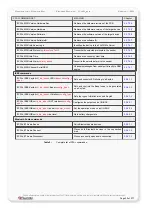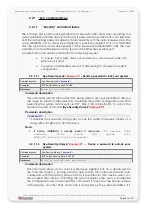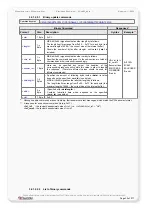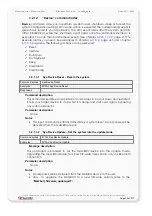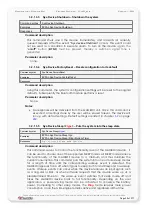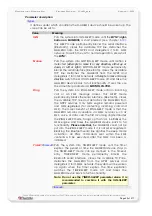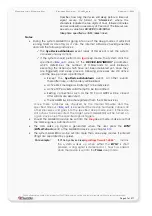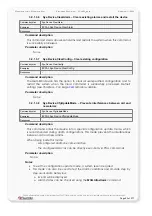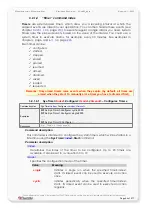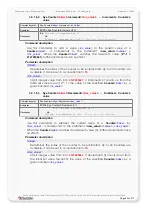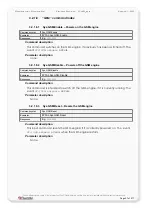
C
ONFIGURATION
C
OMMAND
S
ET
- F
IRMWARE
R
EVISION
2.4.0_
BETA
-
V
ERSION
1.0.0
3.2.1.4
“Timer” command index
Timers
are system-based timers, which allow you a recurring interval at which the
elapsed events are raised in your application. You can then handle these events (see
chapter
to execute regular or single alarms you need. System
Timers raise the elapsed events, based on the value of the interval. You could use a
system Timer to execute alarms, for example, every 30 minutes. See examples in
chapters , page and
Each timer can be:
configured,
started,
stopped,
erased
paused
resumed
armed,
disarmed,
saved
loaded
requested
Remarks: Only armed timers raise events when they expire (by default, all times are
armed when they start. To manually arm a timer you have to disarm it first).
3.2.1.4.1
Sys.Timer<
index
>.Configure=<
mode
>,<
timeout
> – Configures Timers
Command syntax
Examples
$PFAL,Sys.Timer
0
.Configure=cyclic,5000
$PFAL,Sys.Timer
1
.Configure=single,2000
……
……
$PFAL,Sys.Timer
19
.Configure=……………………
Responses
E.g. Timer 0 configured
Command description
This command is intended to configure the system timers, which will be started in a
later time using the
Sys.Timer<
>.Start
command.
Parameter description
<index>
Determines the index of the timer to be configured. Up to 20 Timers are
available. It can be set to a value from 0 to 19.
<mode>
Specifies the configuration mode of the Timer.
Value
Meaning
single
Initiates a single run when the specified timer<index>
starts. Its raised event can be used to execute an action
once.
cyclic
Initiates periodically when the specified timer<index>
starts. Its raised event can be used to execute an action
regularly.
This confidential document is a property of FALCOM and may not be copied or circulated without previous permission.
Page 44 of 271

